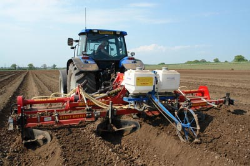
The arrival of a new three-bed tiller this spring prompted Yorkshire potato grower David Wainwright to take up an offer from Bayer CropScience to have a bespoke nematicide applicator fitted, enabling precision incorporation of the company's Mocap nematicide.
Mr Wainwright is farm manager of 1000 acres of owned and rented land to the east of York belonging to RS Cockerill (Farms) Ltd, around 50 per cent of which is devoted to growing between 8000 and 9000 tonnes of potatoes a year. He is one of a number of substantial growers around the country for whom Bayer is sponsoring the use of new application equipment – in this case a pneumatic machine manufactured by Horstine Farmery, which delivers the granules directly into the ridge and affords tight adherence to stewardship guidelines
"PCN and spraing are the principal threats to yield and quality in the locality," Mr Wainwright explains, "with wireworm on some of the land, so we're happy to give Mocap a try. Initial impressions are that the system works well and gets the nematicide exactly where it needs to be."
As part of a rotation comprising cereals and sugar beet, the Cockerill potato operation is centred on growing crisping varieties for Walkers, principally Lady Rosetta and Hermes, with a few chipping varieties for the North Yorkshire chip shop trade.
Bayer CropScience commercial technical manager Chris Boyce believes growers choosing to try Mocap for PCN control will soon witness the benefits of switching. "It's not just the significantly improved margin over cost, when compared with other products, that they'll see," he says, "but better long-term control of PCN populations." Using a machine designed for large volume applications makes the job easier, he adds, but growers preferring to continue using existing microband application equipment, can be supplied with different rotors, specifically designed to apply Mocap at the correct rate of 100kg/ha.
